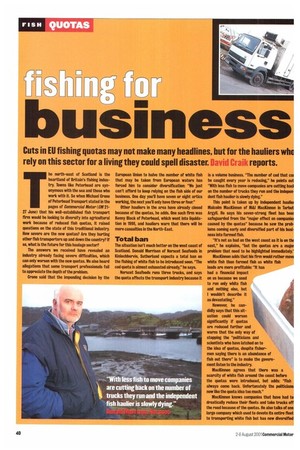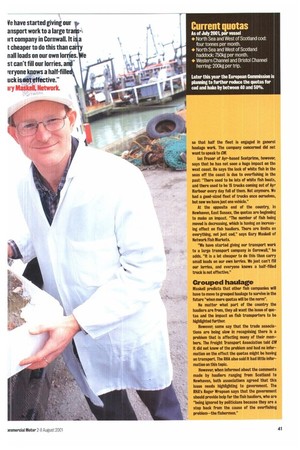bus ness
Page 40

Page 41

If you've noticed an error in this article please click here to report it so we can fix it.
Cuts in EU fishing quotas may not make many headlines, but for the hauliers who rely on this sector for a living they could spell disaster. David Craik reports.
The north-east of Scotland is the heartland of Britain's fishing industry. Towns like Peterhead are synonymous with the sea and those who work with it. So when Michael Crone of Peterhead Transport stated in the pages of Commercial Motor (CM 2127 June) that his well-established fish transport firm would be looking to diversify into agricultural work because of reduced fish quotas, it raised questions on the state of this traditional industry. How severe are the new quotas? Are they hurting other fish transporters up and down the country? If so, what is the future for this haulage sector?
The answers we received have revealed an industry already facing severe difficulties, which can only worsen with the new quotas. We also heard allegations that some transport professionals fail to appreciate the depth of the problem.
Crone said that the impending decision by the European Union to halve the number of white fish that may be taken from European waters has forced him to consider diversification: "We just can't afford to keep relying on the fish side of our business. One day you'll have seven or eight artics working, the next you'll only have three or four."
Other hauliers in the area have already closed because of the quotas, he adds. One such firm was Kenny Black of Peterhead, which went into liquidation in 1998, and hauliers warn that there will be more casualties in the North-East.
Total ban
The situation isn't much better on the west coast of Scotland. Donald Morrison of Norscot Seafoods in Kinlochbervie, Sutherland expects a total ban on the fishing of white fish to be introduced soon. "The cod quota is almost exhausted already," he says.
Norscot Seafoods runs three trucks, and says the quota affects the transport industry because it
is a volume business. "The number of cod that cm be caught every year is reducing," he points out "With less fish to move companies are cutting bad on the number of trucks they run and the indepen. dent fish haulier is slowly dying."
This point is taken up by independent haulier Malcolm MacKinnon of M&I MacKinnon in Tarbut Argyll. He says his seven-strong fleet has beer safeguarded from the "major effect on companim caused by the quotas" because he saw the problems coming early and diversified part of his business into farmed fish.
"it's not as bad on the west coast as it is on ttn east," he explains, "but the quotas are a major problem that need to be highlighted immediately.'
MacKinnon adds that his firm would rather move white fish than farmed fish as white fish
loads are more profitable: "II has had a financial impact on us because we used to run only white fish and nothing else, but I wouldn't describe it as devastating."
However, he candidly says that this sttuation could worsen significantly if quotas are reduced further and warns that the only way of stopping the "politicians and scientists who have latched on to the idea of quotas, despite fishermen saying there is an abundance of fish out there" is to make the government listen to the industry.
MacKinnon agrees that there was a scarcity of white fish around the coast before the quotas were introduced, but adds: "Fish always come back. Unfortunately the politicians now like the quota idea too much."
MacKinnon knows companies that have had to drastically reduce their fleets and take trucks off the road because of the quotas. He also talks of one large company which used to devote its entire fleet to transporting white fish but has now diversified so that half the fleet is engaged in general haulage work. The company concerned did not want to speak to CM.
Ian Fraser of Ayr-based Scotprime, however, says that he has not seen a huge impact on the west coast. He says the lack of white fish in the seas off the coast is due to overfishing in the past: "There used to be lots of white fish boats., and there used to be 15 trucks coming out of Ay r. Harbour every day full of them. Not anymore. We had a good-sized fleet of trucks once ourselves, but now we have just one vehicle."
At the opposite end of the country, in Newhaven, East Sussex, the quotas are beginning to make an impact. "The number of fish being moved is decreasing, which is having an increasing effect on fish hauliers. There are limits on everything, not just cod," says Gary Maskell of Network Fish Markets.
We have started giving our transport work to a large transport company in Cornwall," he adds. "It is a lot cheaper to do this than carry small loads on our own lorries. We just can't fill our lorries, and everyone knows a half-filled truck is not effective,"
Grouped haulage
fAaskell predicts that other fish companies will have to move to grouped haulage to survive in the future -when more quotas will be the norm".
No matter what part of the country the hauliers are from, they all want the issue of quotas and the impact on fish transporters to be highlighted further.
However, some say that the trade associations are being slow in recognising there is a problem that is affecting many of their members. The Freight Transport Association told CM it did not know of the problem and had no information on the effect the quotas might be having on transport. The RHA also said it had little information on this topic.
However, when informed about the comments made by hauliers ranging from Scotland I Newhaven, both associations agreed that this issue needs highlighting to government. The RHA's Roger Wrapson says that the government should provide help for the fish hauliers, who are "being ignored by politicians because they are a step back from the cause of the overfishing problem—the fishermen."




















































































































